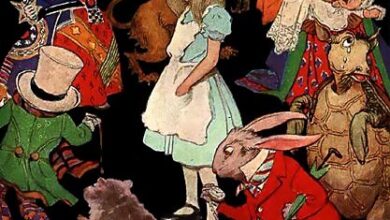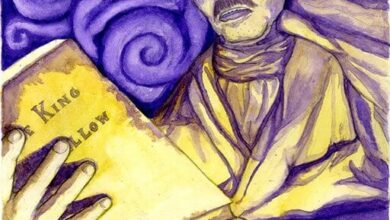
The Devil’s Dictionary by Ambrose Bierce
Originally published as The Cynic’s Word Book, Ambrose Bierce’s wickedly satirical “reference book” was retitled The Devil’s Dictionary in 1911.
Preface
The Devil’s Dictionary was begun in a weekly paper in 1881, and was continued in a desultory way at long intervals until 1906. In that year a large part of it was published in covers with the title The Cynic’s Word Book, a name which the author had not the power to reject or happiness to approve. To quote the publishers of the present work: “This more reverent title had previously been forced upon him by the religious scruples of the last newspaper in which a part of the work had appeared, with the natural consequence that when it came out in covers the country already had been flooded by its imitators with a score of ‘cynic’ books — The Cynic’s This, The Cynic’s That, and The Cynic’s Other. Most of these books were merely stupid, though some of them added the distinction of silliness. Among them, they brought the word “cynic” into disfavor so deep that any book bearing it was discredited in advance of publication. Meantime, too, some of the enterprising humorists of the country had helped themselves to such parts of the work as served their needs, and many of its definitions, anecdotes, phrases and so forth, had become more or less current in popular speech. This explanation is made, not with any pride of priority in trifles, but in simple denial of possible charges of plagiarism, which is no trifle. In merely resuming his own the author hopes to be held guiltless by those to whom the work is addressed — enlightened souls who prefer dry wines to sweet, sense to sentiment, wit to humor and clean English to slang. A conspicuous, and it is hope not unpleasant, feature of the book is its abundant illustrative quotations from eminent poets, chief of whom is that learned and ingenius cleric, Father Gassalasca Jape, S.J., whose lines bear his initials. To Father Jape’s kindly encouragement and assistance the author of the prose text is greatly indebted.
Done to a turn on the iron, behold
Him who to be famous aspired.
Content? Well, his grill has a plating of gold,
And his twistings are greatly admired.
Hassan Brubuddy
A king there was who lost an eye
In some excess of passion;
And straight his courtiers all did try
To follow the new fashion.
Each dropped one eyelid when before
The throne he ventured, thinking
'Twould please the king. That monarch swore
He'd slay them all for winking.
What should they do? They were not hot
To hazard such disaster;
They dared not close an eye -- dared not
See better than their master.
Seeing them lacrymose and glum,
A leech consoled the weepers:
He spread small rags with liquid gum
And covered half their peepers.
The court all wore the stuff, the flame
Of royal anger dying.
That's how court-plaster got its name
Unless I'm greatly lying.
Naramy Oof
as in modern times they are popular with the Chinese; though it is believed that the ancient dead, like the modern, were light eaters. Among the many feasts of the Romans was the _Novemdiale_, which was held, according to Livy, whenever stones fell from heaven.
The Maker, at Creation's birth,
With living things had stocked the earth.
From elephants to bats and snails,
They all were good, for all were males.
But when the Devil came and saw
He said: "By Thine eternal law
Of growth, maturity, decay,
These all must quickly pass away
And leave untenanted the earth
Unless Thou dost establish birth" --
Then tucked his head beneath his wing
To laugh -- he had no sleeve -- the thing
With deviltry did so accord,
That he'd suggested to the Lord.
The Master pondered this advice,
Then shook and threw the fateful dice
Wherewith all matters here below
Are ordered, and observed the throw;
Then bent His head in awful state,
Confirming the decree of Fate.
From every part of earth anew
The conscious dust consenting flew,
While rivers from their courses rolled
To make it plastic for the mould.
Enough collected (but no more,
For niggard Nature hoards her store)
He kneaded it to flexible clay,
While Nick unseen threw some away.
And then the various forms He cast,
Gross organs first and finer last;
No one at once evolved, but all
By even touches grew and small
Degrees advanced, till, shade by shade,
To match all living things He'd made
Females, complete in all their parts
Except (His clay gave out) the hearts.
"No matter," Satan cried; "with speed
I'll fetch the very hearts they need" --
So flew away and soon brought back
The number needed, in a sack.
That night earth range with sounds of strife --
Ten million males each had a wife;
That night sweet Peace her pinions spread
O'er Hell -- ten million devils dead!
G.J.
When David said: "All men are liars," Dave,
Himself a liar, fibbed like any thief.
Perhaps he thought to weaken disbelief
By proof that even himself was not a slave
To Truth; though I suspect the aged knave
Had been of all her servitors the chief
Had he but known a fig's reluctant leaf
Is more than e'er she wore on land or wave.
No, David served not Naked Truth when he
Struck that sledge-hammer blow at all his race;
Nor did he hit the nail upon the head:
For reason shows that it could never be,
And the facts contradict him to his face.
Men are not liars all, for some are dead.
Bartle Quinker
To Rome said Nero: "If to smoke you turn
I shall not cease to fiddle while you burn."
To Nero Rome replied: "Pray do your worst,
'Tis my excuse that you were fiddling first."
Orm Pludge
Folly! although Erasmus praised thee once
In a thick volume, and all authors known,
If not thy glory yet thy power have shown,
Deign to take homage from thy son who hunts
Through all thy maze his brothers, fool and dunce,
To mend their lives and to sustain his own,
However feebly be his arrows thrown,
Howe'er each hide the flying weapons blunts.
All-Father Folly! be it mine to raise,
With lusty lung, here on his western strand
With all thine offspring thronged from every land,
Thyself inspiring me, the song of praise.
And if too weak, I'll hire, to help me bawl,
Dick Watson Gilder, gravest of us all.
Aramis Loto Frope
"Force is but might," the teacher said --
"That definition's just."
The boy said naught but through instead,
Remembering his pounded head:
"Force is not might but must!"
When Adam long ago in Cupid's awful court
(For Cupid ruled ere Adam was invented)
Sued for Eve's favor, says an ancient law report,
He stood and pleaded unhabilimented.
"You sue _in forma pauperis_, I see," Eve cried;
"Actions can't here be that way prosecuted."
So all poor Adam's motions coldly were denied:
He went away -- as he had come -- nonsuited.
G.J.
Freedom, as every schoolboy knows,
Once shrieked as Kosciusko fell;
On every wind, indeed, that blows
I hear her yell.
She screams whenever monarchs meet,
And parliaments as well,
To bind the chains about her feet
And toll her knell.
And when the sovereign people cast
The votes they cannot spell,
Upon the pestilential blast
Her clamors swell.
For all to whom the power's given
To sway or to compel,
Among themselves apportion Heaven
And give her Hell.
Blary O'Gary
The sea was calm and the sky was blue;
Merrily, merrily sailed we two.
(High barometer maketh glad.)
On the tipsy ship, with a dreadful shout,
The tempest descended and we fell out.
(O the walking is nasty bad!)
Armit Huff Bettle
FRYING-PAN, n. One part of the penal apparatus employed in that punitive institution, a woman's kitchen. The frying-pan was invented by Calvin, and by him used in cooking span-long infants that had died without baptism; and observing one day the horrible torment of a tramp who had incautiously pulled a fried babe from the waste-dump and devoured it, it occurred to the great divine to rob death of its
terrors by introducing the frying-pan into every household in Geneva. Thence it spread to all corners of the world, and has been of invaluable assistance in the propagation of his sombre faith. The following lines (said to be from the pen of his Grace Bishop Potter) seem to imply that the usefulness of this utensil is not limited to this world; but as the consequences of its employment in this life reach over into the life to come, so also itself may be found on the other side, rewarding its devotees:
Old Nick was summoned to the skies.
Said Peter: "Your intentions
Are good, but you lack enterprise
Concerning new inventions.
"Now, broiling in an ancient plan
Of torment, but I hear it
Reported that the frying-pan
Sears best the wicked spirit.
"Go get one -- fill it up with fat --
Fry sinners brown and good in't."
"I know a trick worth two o' that,"
Said Nick -- "I'll cook their food in't."
The savage dies -- they sacrifice a horse
To bear to happy hunting-grounds the corse.
Our friends expire -- we make the money fly
In hope their souls will chase it to the sky.
Jex Wopley




